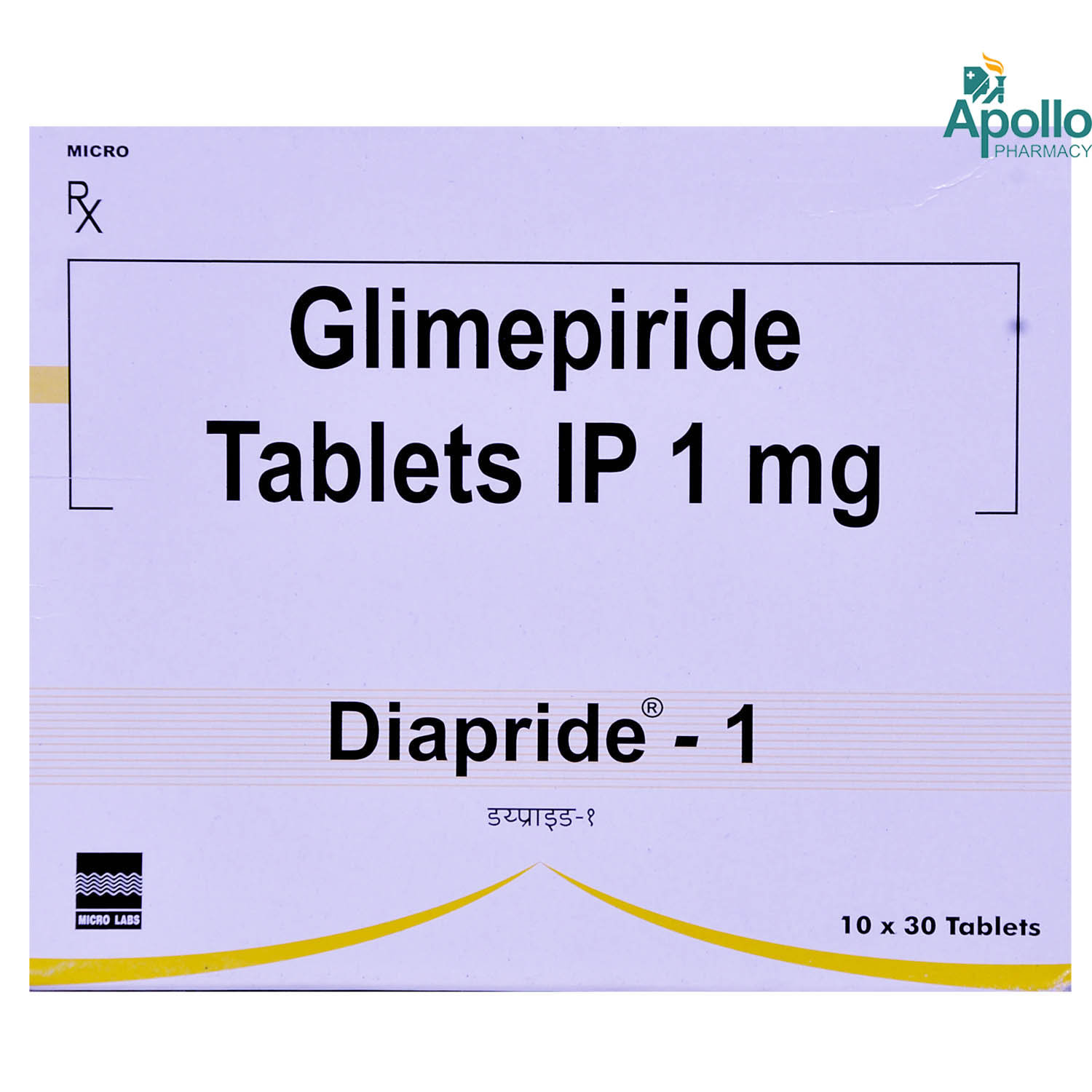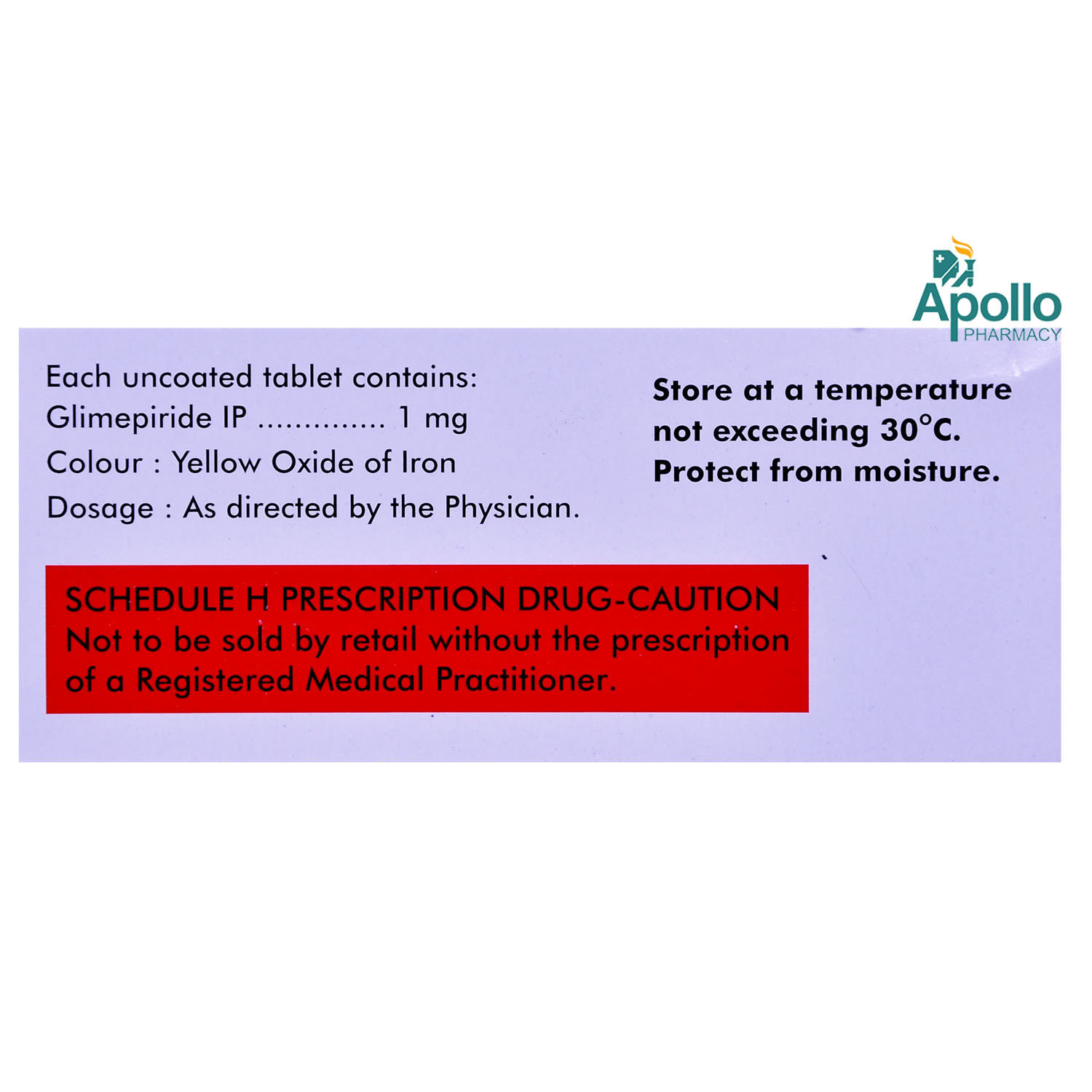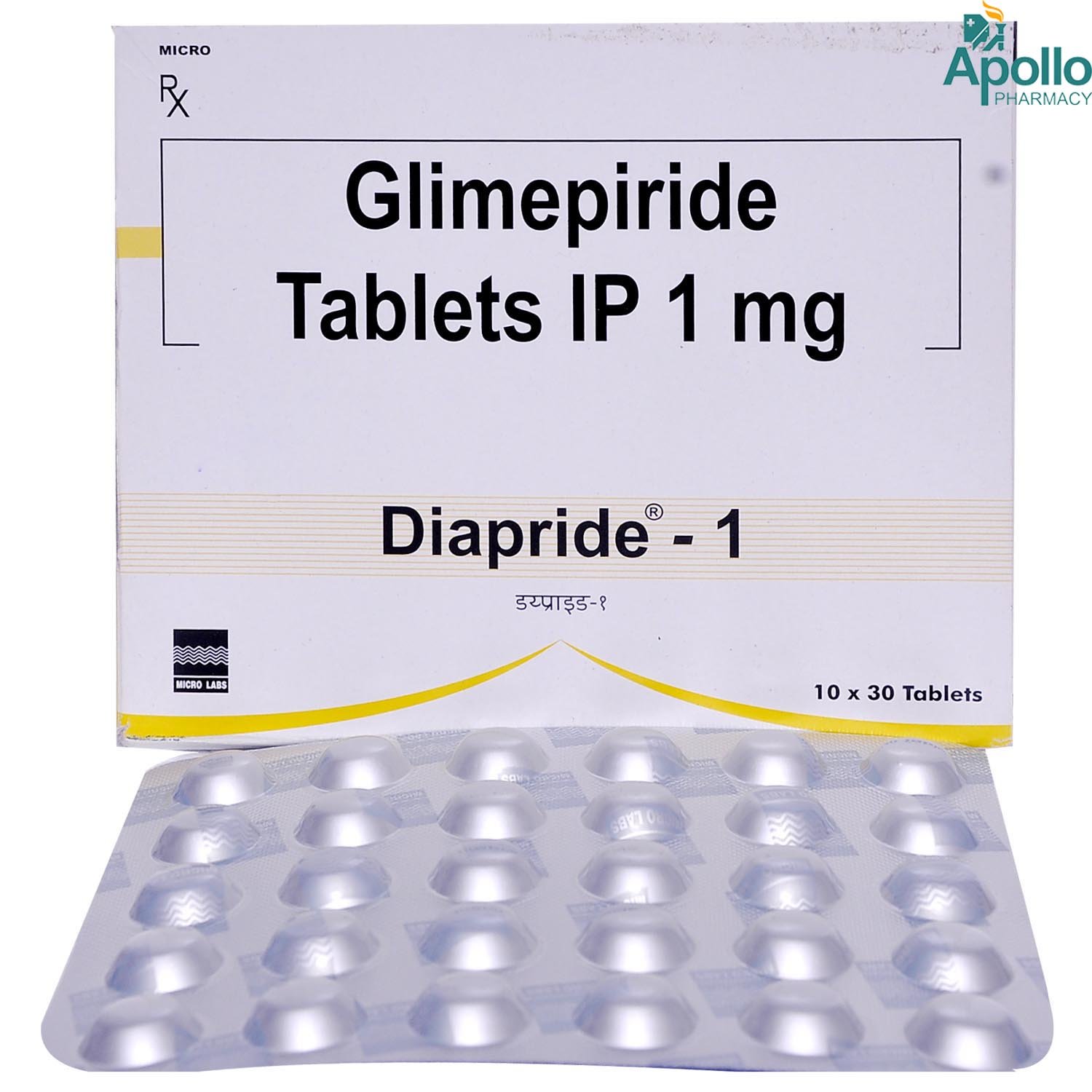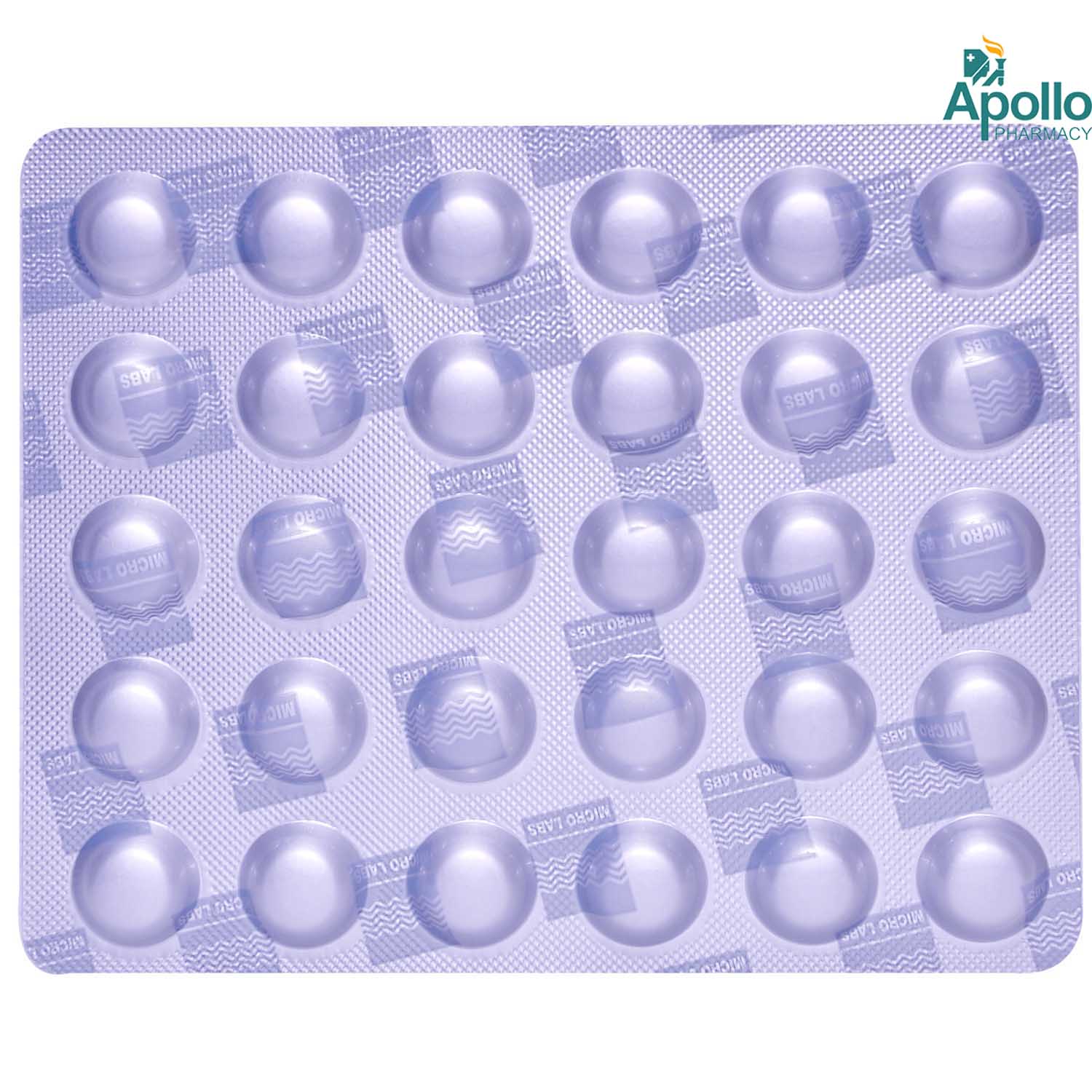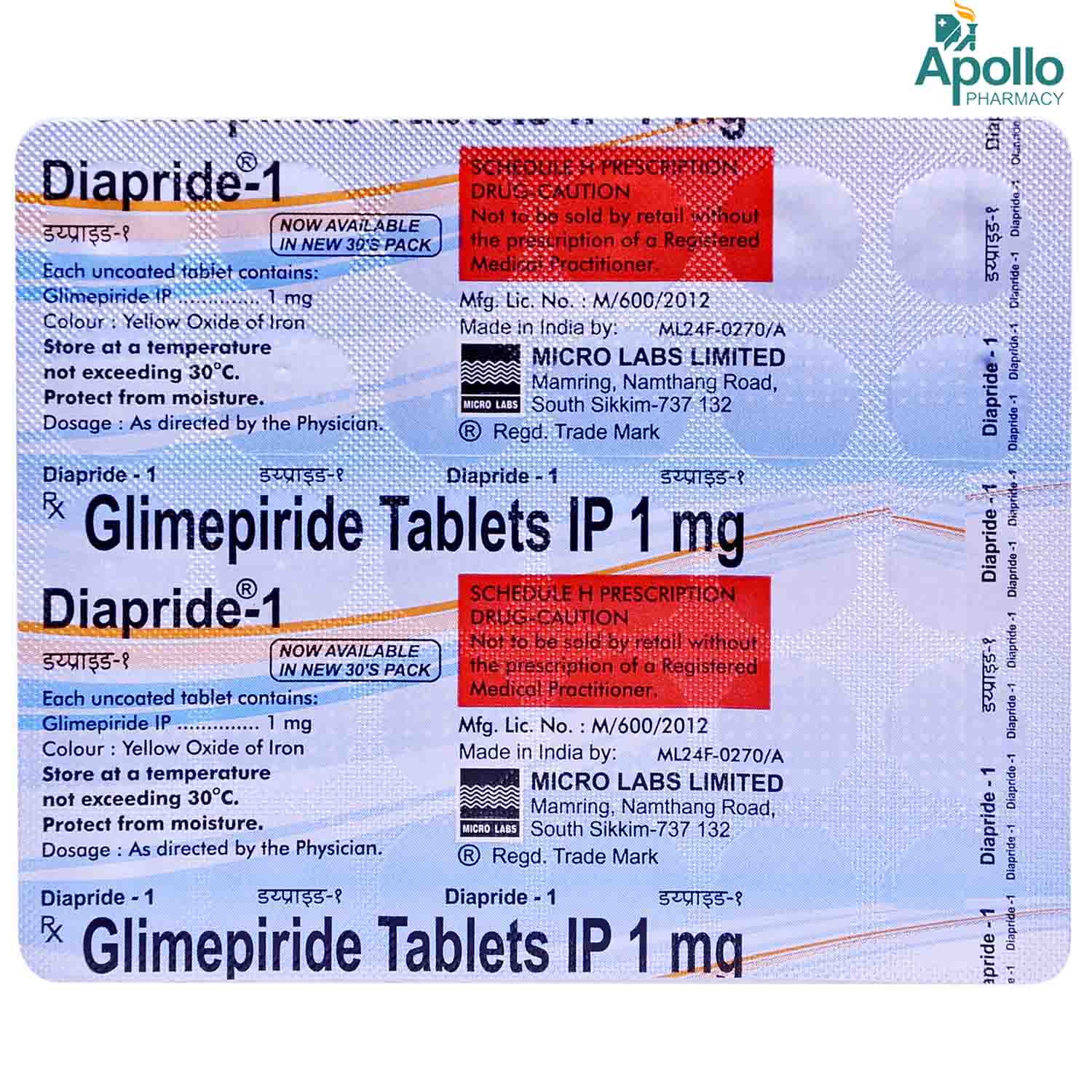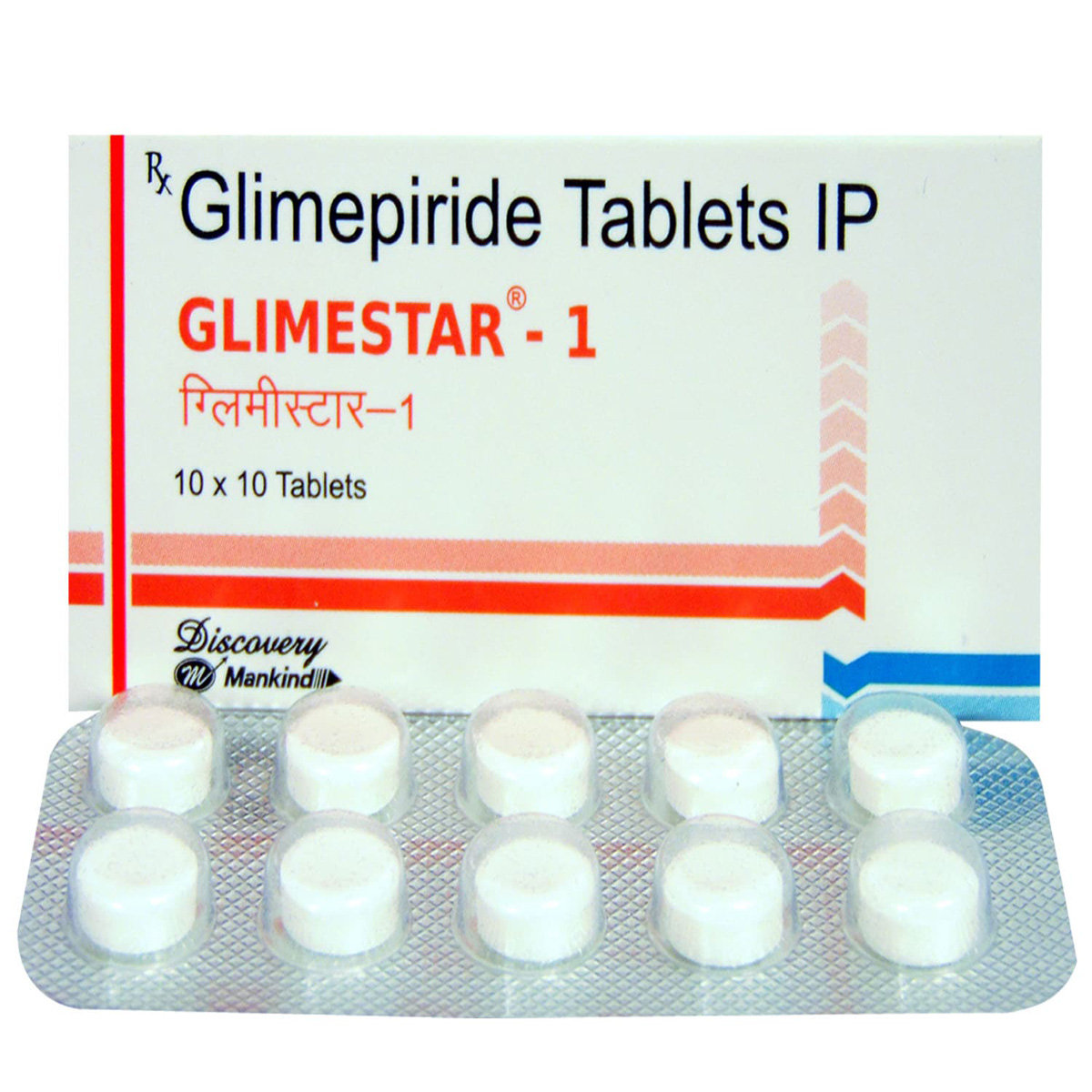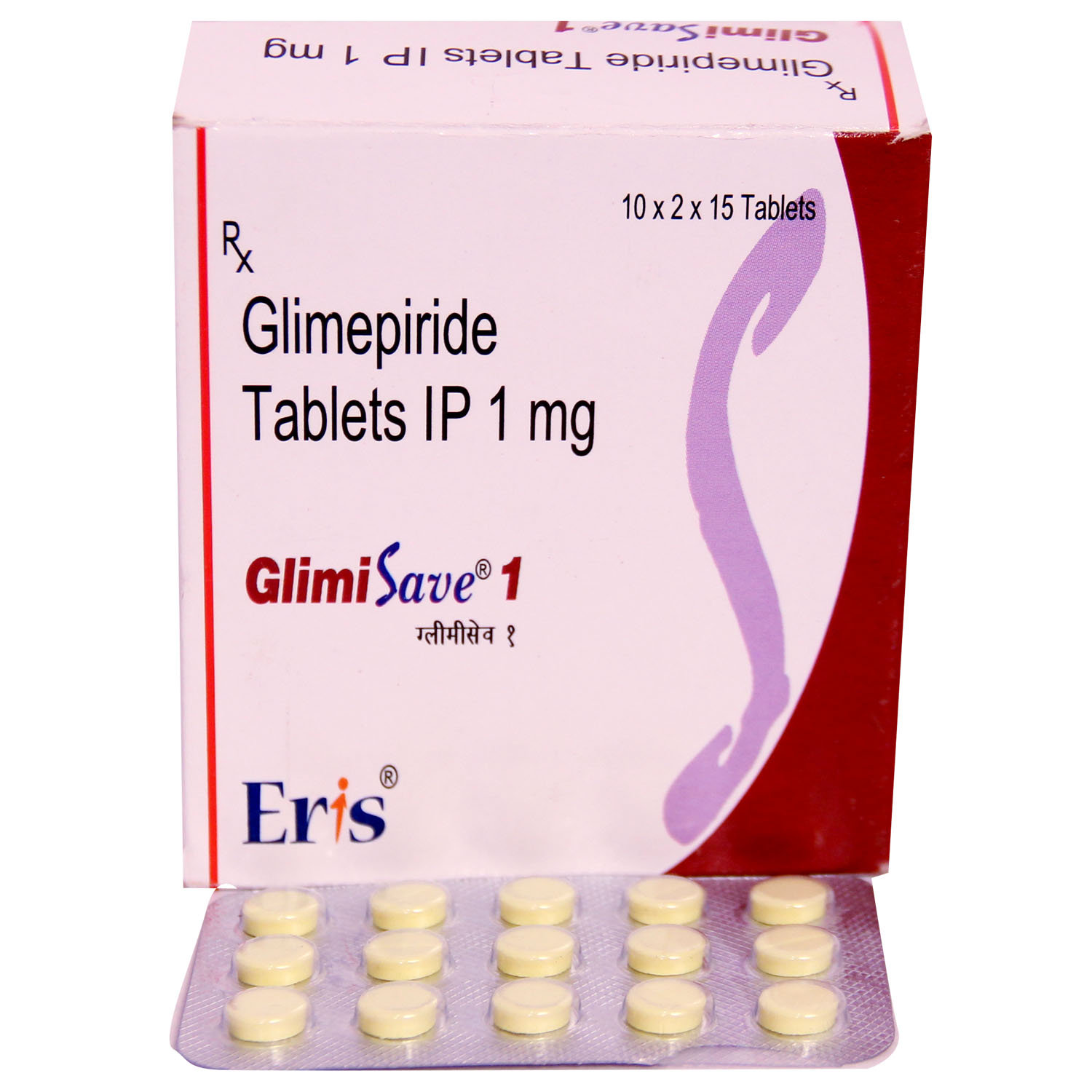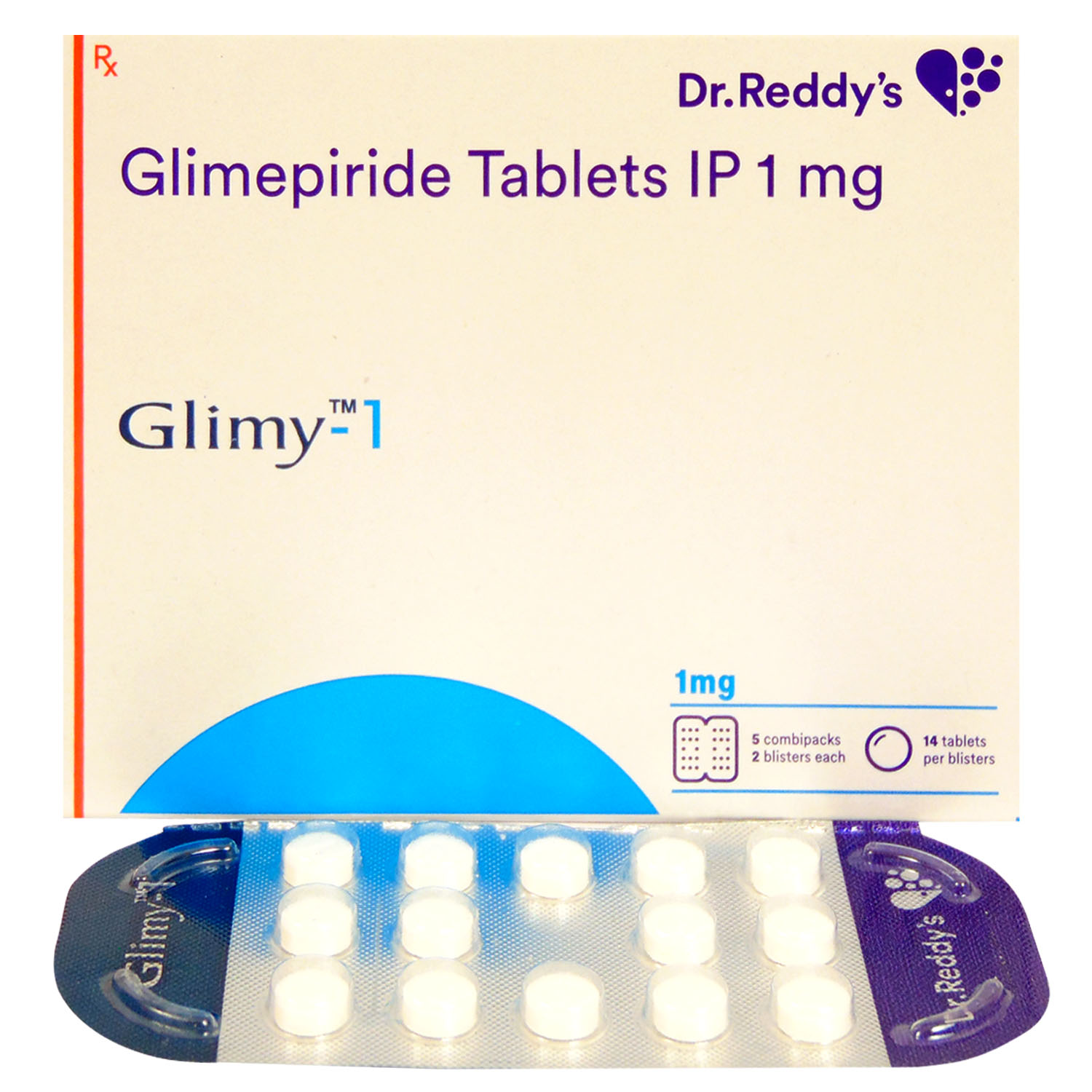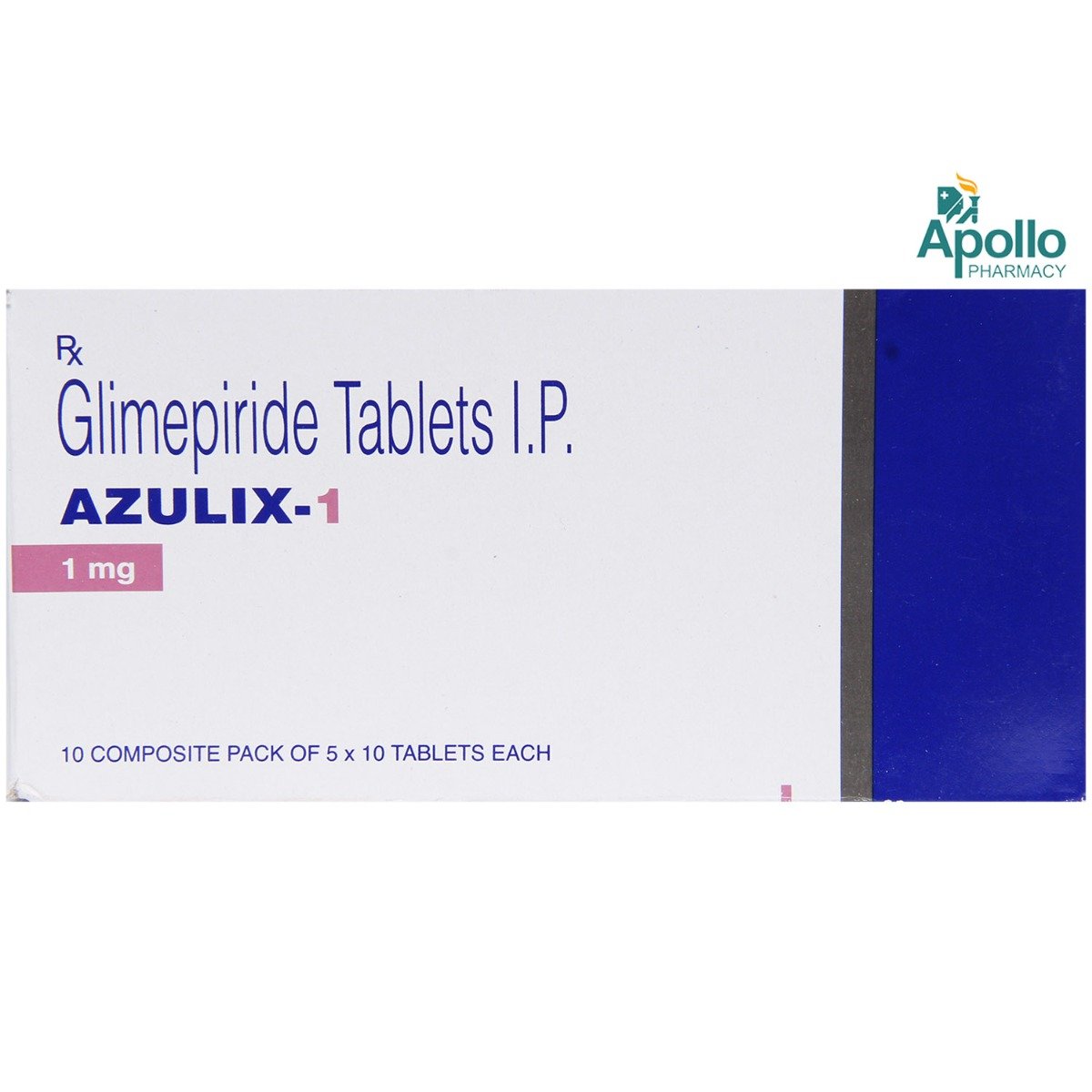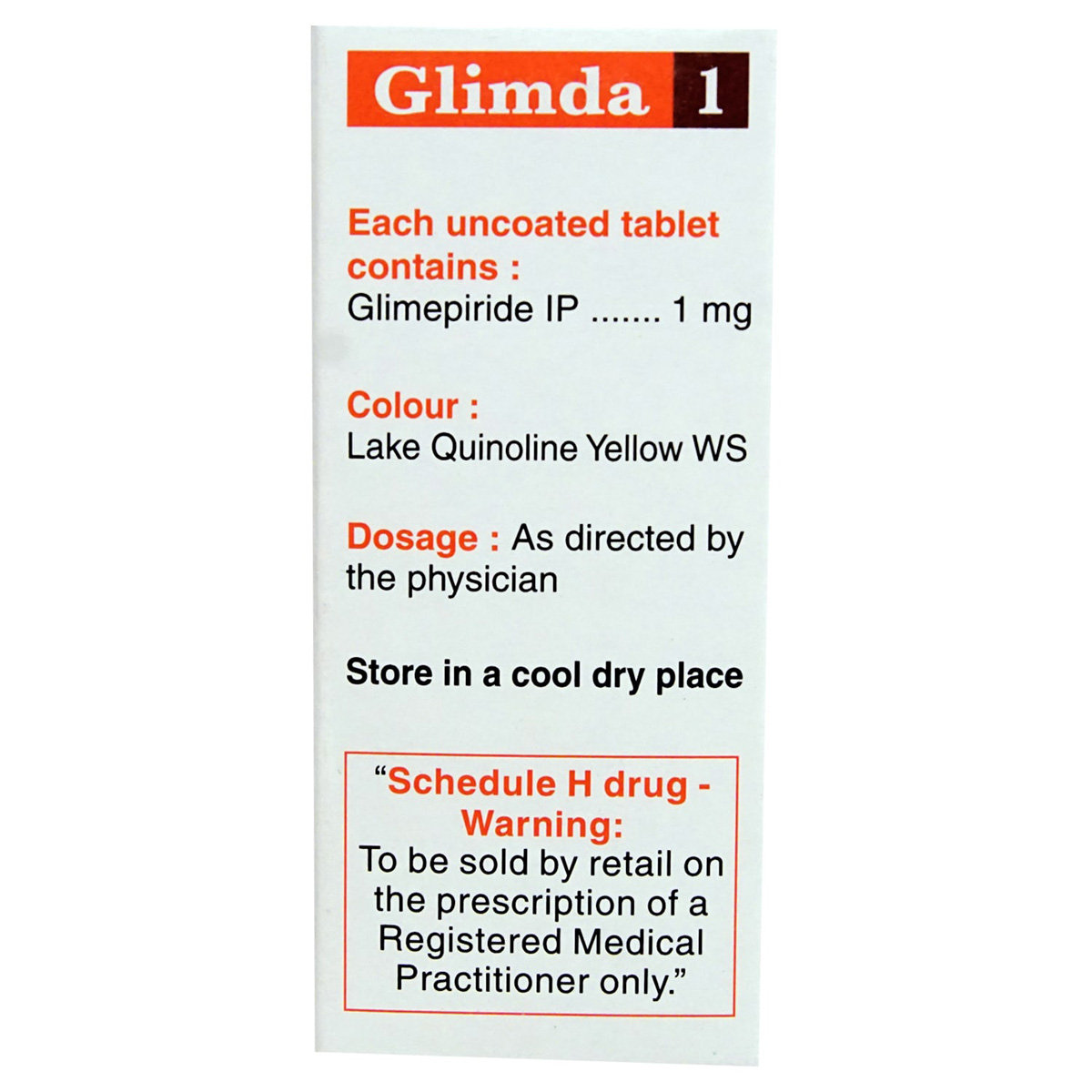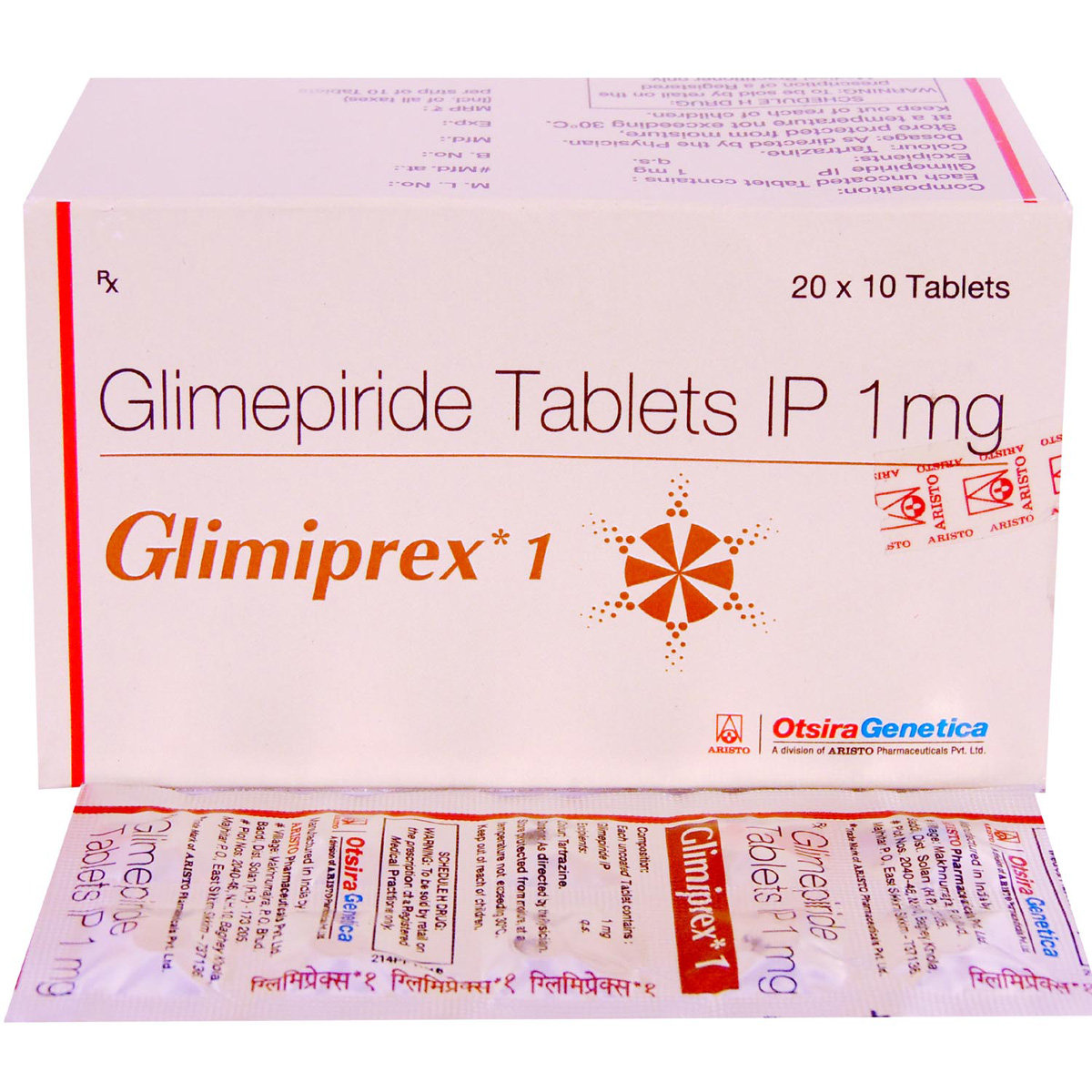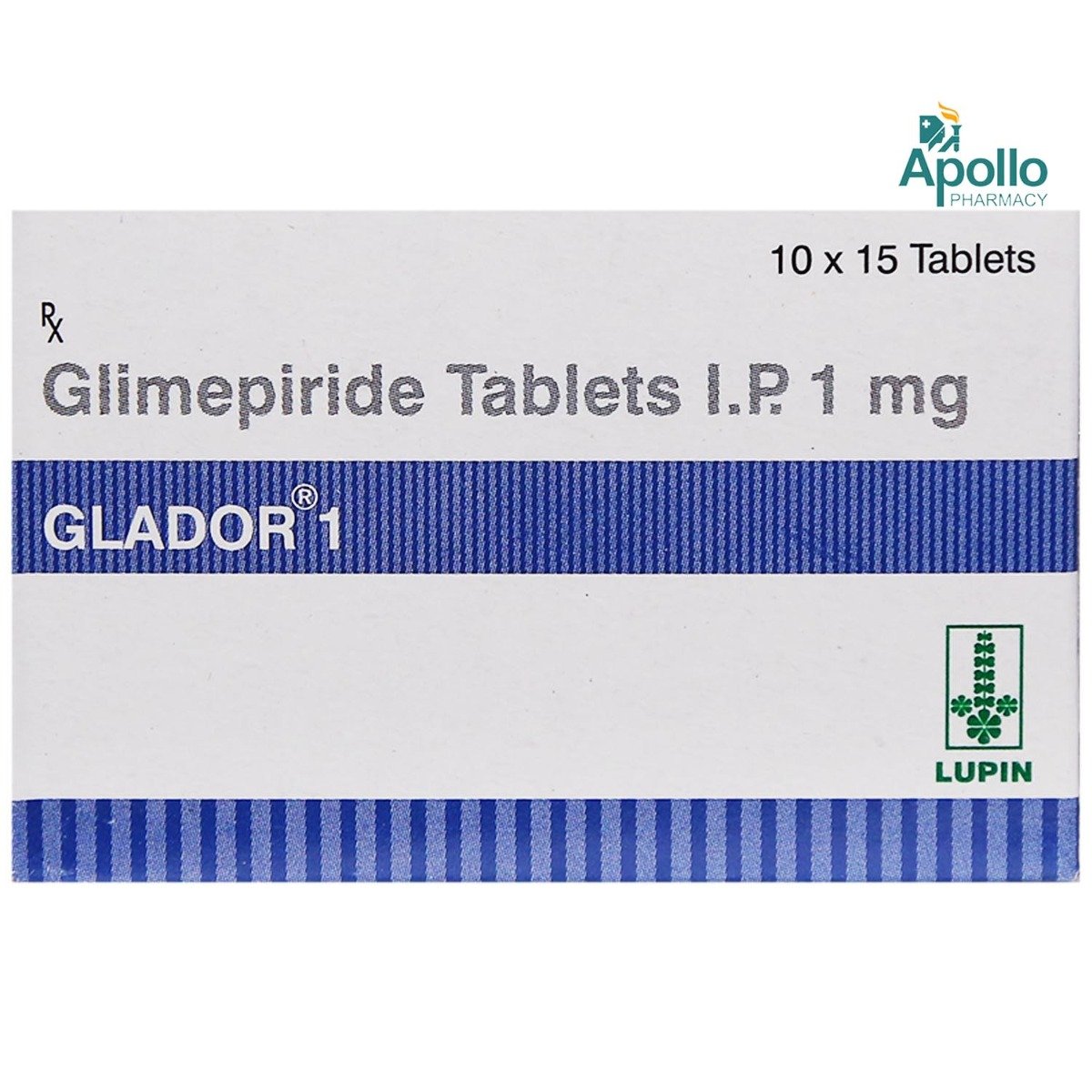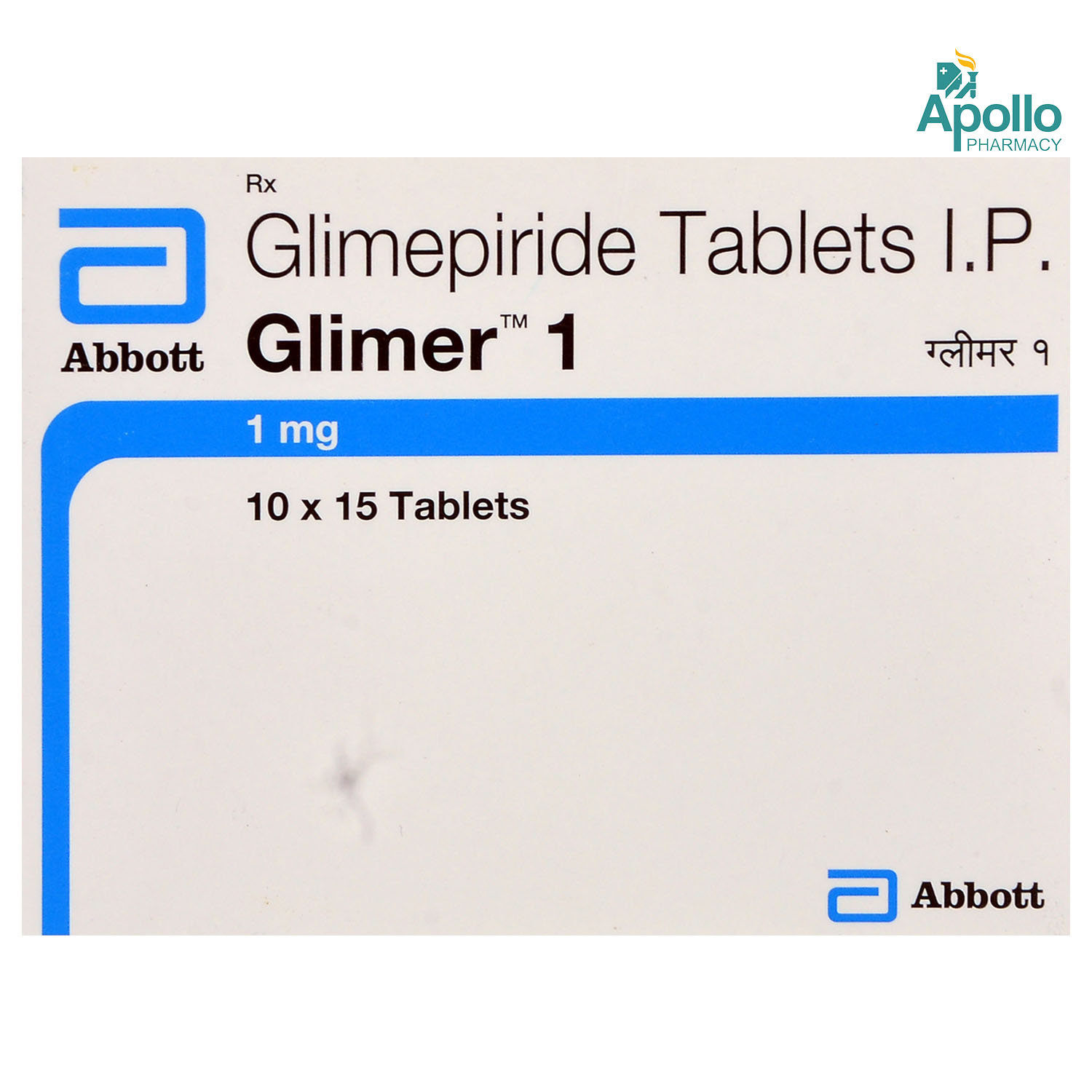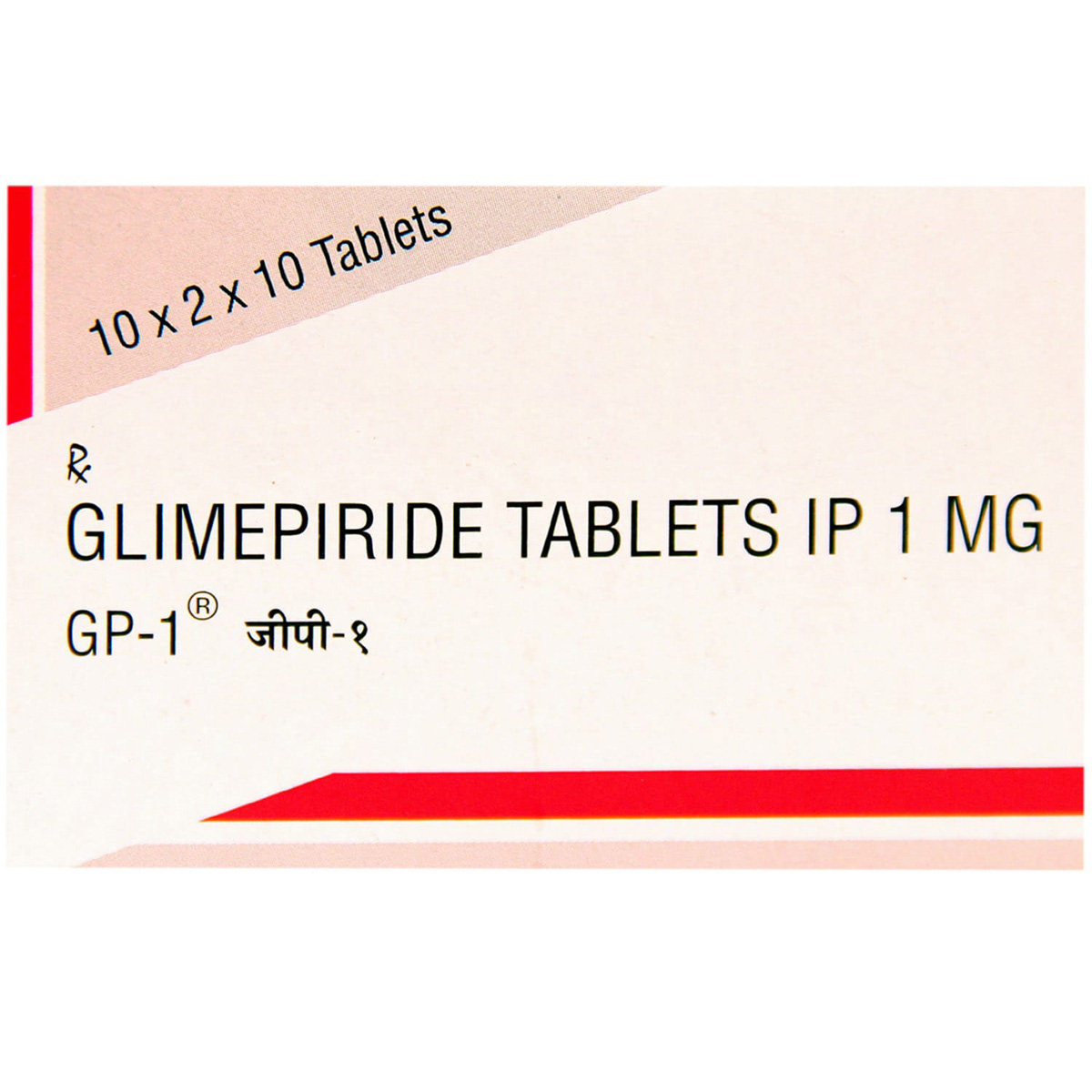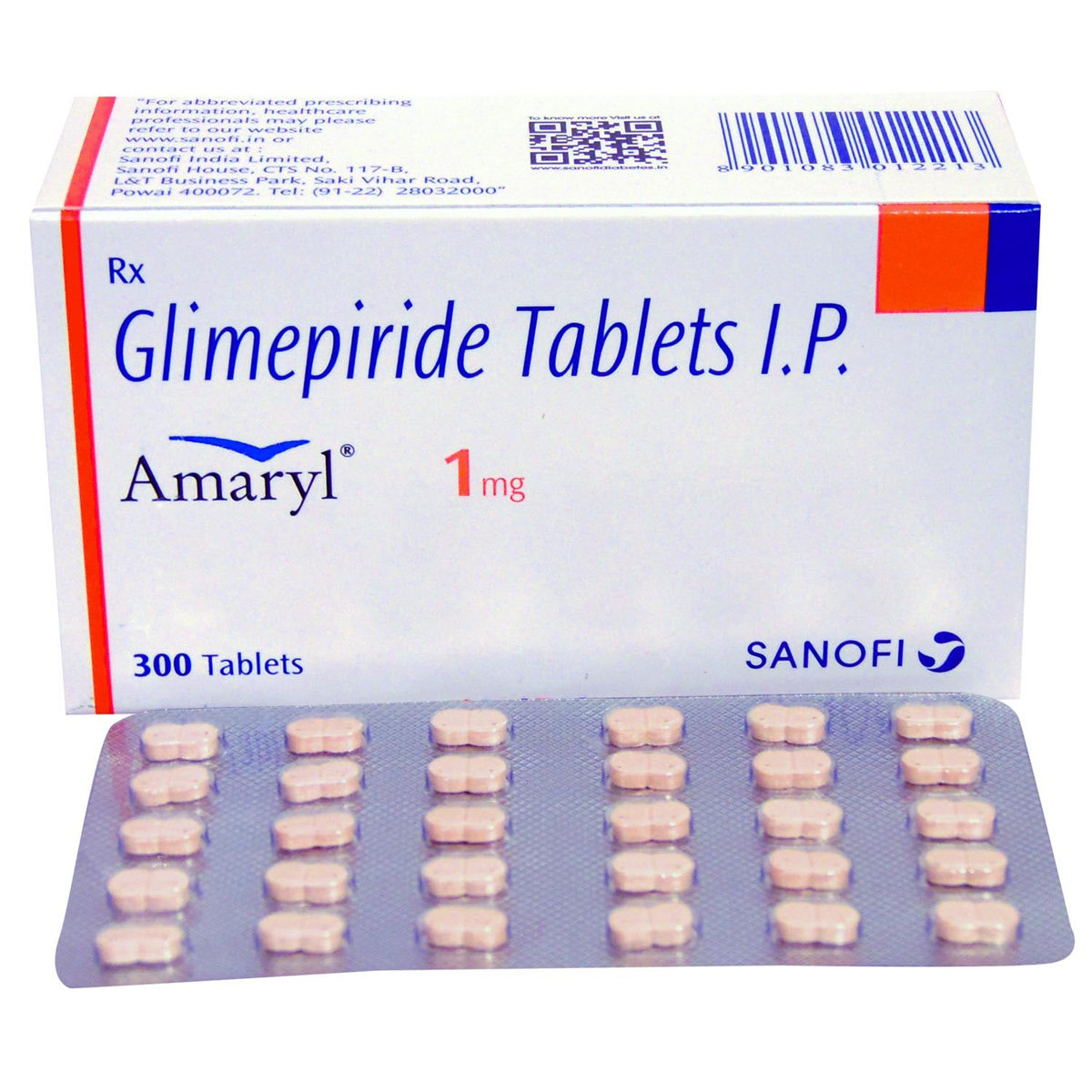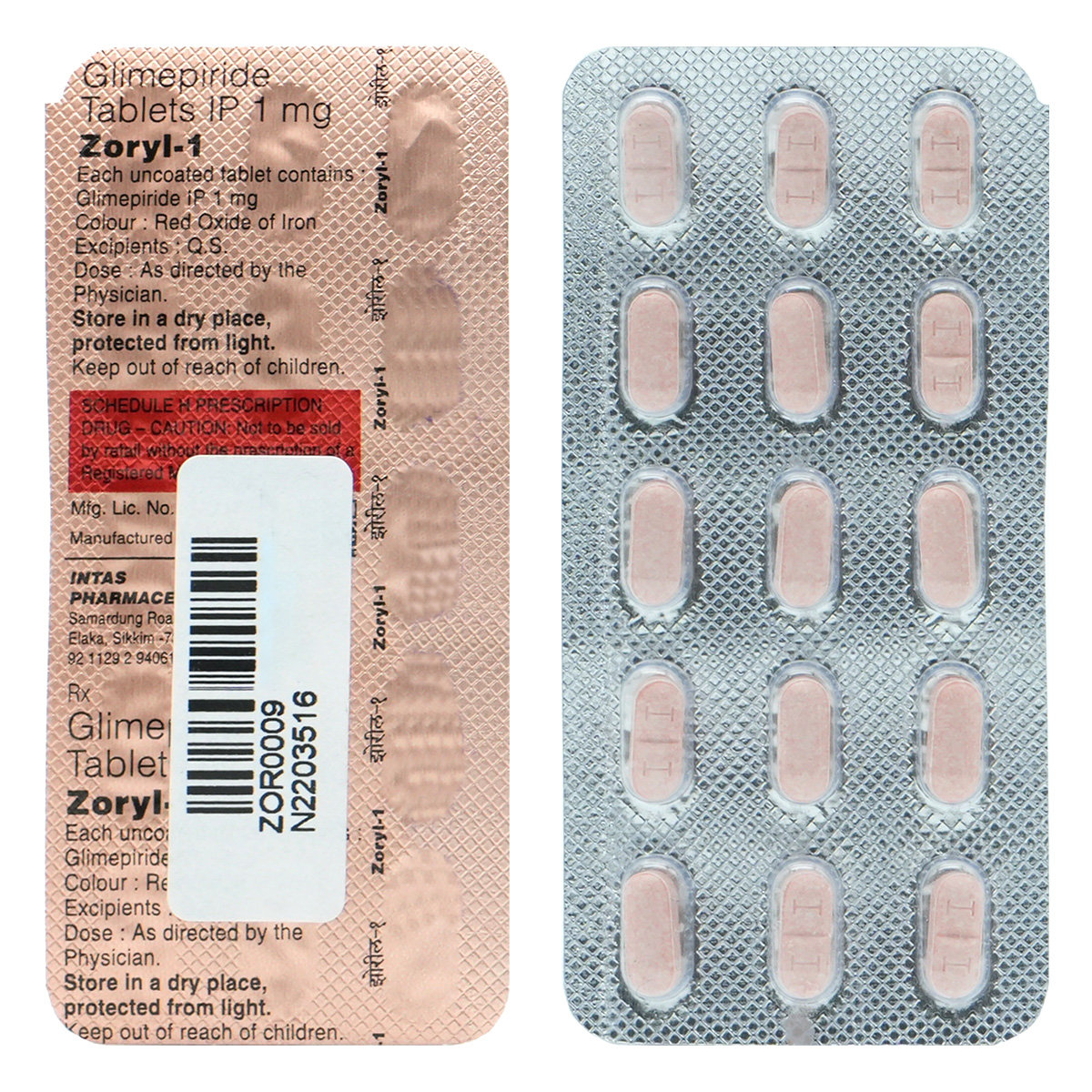Diapride-1 Tablet 30's
MRP ₹116
(Inclusive of all Taxes)
₹17.4 Cashback (15%)
Selected Pack Size:30
30 ₹104.4
(₹3.48 per unit)
In Stock
10 ₹33.8
(₹3.38 per unit)
In Stock
Provide Delivery Location
Online payment accepted
 Prescription drug
Prescription drugWhats That
Composition :
Manufacturer/Marketer :
Consume Type :
Expires on or after :
Return Policy :
NPPA :
About Diapride-1 Tablet
Diapride-1 Tablet belongs to a class of antidiabetic called 'sulfonylureas' used to lower raised blood sugar levels in Type 2 diabetes mellitus (non-insulin-dependent diabetes mellitus - NIDDM). Type 2 diabetes develops if the body does not produce enough insulin or when your body's insulin does not work as well as it should. Insulin is a substance that helps to lower the level of sugar in your blood, especially after meals.
The Diapride-1 Tablet contains Glimepiride which acts on insulin-secreting cells called beta cells inside the pancreas and activates calcium channels on cells which lets insulin pass out of the cell. This insulin then makes each cell in the body take up glucose and utilize it, thus lowering raised blood glucose. Therefore, it prevents symptoms of type 2 diabetes.
Take Diapride-1 Tablet as prescribed by your doctor. Some people may experience an allergic reaction (skin rash, hives & sensitivity to sun rays), liver dysfunction (jaundice, bile duct blockage, and hepatitis), seizures, coma & low glucose levels. Most of these side effects of Diapride-1 Tablet do not require medical attention and gradually resolve over time. However, if the side effects persist or worsen, please consult your doctor.
Diapride-1 Tablet should not be stopped even if you feel better without consulting your doctor as the sugar level keeps changing. If you stop taking Diapride-1 Tablet abruptly, it may increase your sugar levels which could further increase the risk of eyesight loss (retinopathy), kidney (nephropathy) and nerve damage (neuropathy). Diapride-1 Tablet should not be taken if you have type 1 diabetes mellitus or severe kidney or liver disease. Please inform your doctor if you have any heart disease or plan to get pregnant or breastfeed.
Uses of Diapride-1 Tablet
Directions for Use
Key Benefits
Diapride-1 Tablet is used in people with type 2 diabetes to minimize elevated blood sugar levels with a balanced diet and exercise in combination. Diapride-1 Tablet can be combined with insulin or other forms of oral antidiabetic medication. Diapride-1 Tablet decreases blood sugar levels in a diabetic patient by increasing the production and secretion of insulin from the pancreas beta cells. Thus, it helps in controlling increased blood sugar levels after the meal.
Storage
- If you experience low blood sugar levels, inform your doctor. They will assess the severity and make recommendations for the next actions.
- Your doctor will assess your symptoms, blood sugar levels, and overall health before recommending the best course of action, which may include treatment, lifestyle modifications, or prescription adjustments.
- Follow your doctor's instructions carefully to manage the episode and adjust your treatment plan.
- Make medication adjustments as recommended by your doctor to prevent future episodes.
- Implement diet and lifestyle modifications as your doctor advises to manage low blood sugar levels.
- Monitor your blood sugar levels closely for patterns and changes.
- Track your progress by recording your blood sugar levels, food intake, and physical activity.
- Seek further guidance from your doctor if symptoms persist or worsen so that your treatment plan can be revised.
- Get plenty of rest and sleep.
- Keep your body warm.
- Drink plenty of fluids to stay hydrated.
- Avoid strenuous activities.
- Maintain good hygiene to prevent flu from spreading.
- Hydrate your body: Drink enough water to prevent dehydration and headaches.
- Calm Your Mind: Deep breathing and meditation can help you relax and relieve stress.
- Rest and Recharge: Sleep for 7-8 hours to reduce headache triggers.
- Take rest: lie down in a quiet, dark environment.
- Cold or warm compresses can help reduce tension.
- Stay Upright: Maintain good posture to keep symptoms from getting worse.
- To treat headaches naturally, try acupuncture or massage therapy.
- Over-the-counter pain relievers include acetaminophen and ibuprofen.
- Prescription Assistance: Speak with your doctor about more substantial drug alternatives.
- Severe Headaches: Seek emergency medical assistance for sudden, severe headaches.
- Frequent Headaches: If you get reoccurring headaches, consult your doctor.
- Headaches with Symptoms: Seek medical attention if your headaches include fever, disorientation, or weakness.
- Inform your doctor about dizziness symptoms. They may adjust your medication regimen or prescribe additional medications to manage symptoms.
- Follow your doctor's instructions for taking medication, and take it at the same time every day to minimize dizziness.
- When standing up, do so slowly and carefully to avoid sudden dizziness.
- Avoid making sudden movements, such as turning or bending quickly, which can exacerbate dizziness.
- Drink plenty of water throughout the day to stay hydrated and help alleviate dizziness symptoms.
- If you're feeling dizzy, sit or lie down and rest until the dizziness passes.
- Track when dizziness occurs and any factors that may trigger it, and share this information with your doctor to help manage symptoms.
Drug Warnings
Before taking Diapride-1 Tablet , inform your doctor if you are healing from injury, had or going to have surgery, have fever infections or other sources of stress, then contact your doctor as it might be appropriate to adjust care temporarily. If you have a serious kidney/liver disease, breastfeeding or pregnant, consult the doctor before using Diapride-1 Tablet . Do not take Diapride-1 Tablet if you are allergic to sulpha drugs, glimepiride, or any other antidiabetic medicines or have a deficiency of glucose 6-phosphate dehydrogenase (G6PD). A heart disease patient should consult a doctor before taking the Diapride-1 Tablet as it may worsen the heart disease's current conditions. Do not take Diapride-1 Tablet with oral contraceptives as it may increase blood sugar levels. On the other hand, taking Diapride-1 Tablet with pain killers like aspirin or ibuprofen can lower your blood sugar.
Drug-Drug Interactions
Drug-Drug Interactions
Login/Sign Up
Co-administration of Leflunomide may increase the blood levels and effects of Diapride-1 Tablet.
How to manage the interaction:
Although there is a possible interaction, Diapride-1 Tablet can be taken with Leflunomide if prescribed by the doctor. Consult the doctor if your condition changes or you experience increased side effects. Regular monitoring of blood glucose levels is advised. Do not discontinue the medications without consulting a doctor.
Taking Diapride-1 Tablet with sunitinib may increase the risk of low blood sugar.
How to manage the interaction:
Although there is a possible interaction, Diapride-1 Tablet can be taken with sunitinib if prescribed by the doctor. Consult the prescriber if you experience symptoms if low blood sugar such as headache, dizziness, drowsiness, nervousness, confusion, tremor, nausea, hunger, weakness, perspiration, palpitation, and rapid heartbeat. Do not discontinue the medications without consulting a doctor.
Taking Diapride-1 Tablet with Paroxetine may increase the risk of low blood sugar.
How to manage the interaction:
Although there is a possible interaction, Diapride-1 Tablet can be taken with paroxetine if prescribed by the doctor. Consult the prescriber if you experience symptoms of low blood sugar like headache, dizziness, drowsiness, nervousness, confusion, tremor, nausea, hunger, weakness, perspiration, palpitation, and rapid heartbeat. Do not discontinue the medications without consulting a doctor.
Taking Diapride-1 Tablet with Sulfadiazine may increase the risk of low blood sugar.
How to manage the interaction:
Although there is a possible interaction, Diapride-1 Tablet can be taken with sulfadiazine if prescribed by the doctor. Consult the prescriber if you experience symptoms of low blood sugar such as headache, dizziness, drowsiness, nervousness, confusion, tremor, nausea, hunger, weakness, perspiration, palpitation, and rapid heartbeat. Do not discontinue the medications without consulting a doctor. Do not discontinue the medications without consulting a doctor.
Co-administration of Sparfloxacin with Diapride-1 Tablet can affect blood glucose levels. Both high blood glucose and, less frequently, low blood glucose have been reported.
How to manage the interaction:
Although there is a possible interaction, Diapride-1 Tablet can be taken with Sparfloxacin if prescribed by the doctor. Consult the prescriber if you experience symptoms of low blood sugar such as headache, dizziness, drowsiness, nervousness, confusion, tremor, nausea, hunger, weakness, perspiration, palpitation, and rapid heartbeat (or) symptoms of high blood sugar like increased thirst, increased hunger, and increased urination. Monitoring of blood glucose levels is advised. Do not discontinue the medications without consulting a doctor.
Taking Ketoprofen with Diapride-1 Tablet may increase the risk of hypoglycemia (low blood sugar).
How to manage the interaction:
Although there is a possible interaction, Diapride-1 Tablet can be taken with Ketoprofen if prescribed by the doctor. Consult the prescriber if you experience symptoms of low blood sugar such as headache, dizziness, drowsiness, nervousness, confusion, tremor, nausea, hunger, weakness, perspiration, palpitation, and rapid heartbeat. Do not taking the medications without consulting a doctor.
Taking Diapride-1 Tablet with Citalopram may increase the risk of low blood sugar.
How to manage the interaction:
Although there is a possible interaction, Diapride-1 Tablet can be taken with Citalopram if prescribed by the doctor. Consult the prescriber if you experience symptoms of low blood sugar such as headache, dizziness, drowsiness, nervousness, confusion, tremor, nausea, hunger, weakness, perspiration, palpitation, and rapid heartbeat. Do not discontinue the medications without consulting a doctor.
Co-administration of Diapride-1 Tablet with Cinoxacin can sometimes affect blood glucose levels. Both hyperglycemia (high blood glucose) and, less frequently, hypoglycemia (low blood glucose) have been reported.
How to manage the interaction:
Although there is an interaction between Diapride-1 Tablet and Cinoxacin can lead to an interaction. However, consult a doctor immediately if you experience any symptoms of hyperglycemia such as increased thirst, increased hunger, and increased urination of hypoglycemia include headache, dizziness, drowsiness, nervousness, confusion, tremor, nausea, hunger, weakness, perspiration, palpitation, and rapid heartbeat, symptoms of hyperglycemia may include increased thirst, increased hunger, and increased urination. Do not discontinue the medications without consulting a doctor.
When Diapride-1 Tablet is taken with Thioridazine may interfere with blood glucose control and reduce the effectiveness of Diapride-1 Tablet.
How to manage the interaction:
Taking Diapride-1 Tablet with Thioridazine together can possibly result in an interaction, but it can be taken if a doctor has advised it. If you notice any of these signs - really high or low blood sugar levels - make sure to contact a doctor right away. Do not stop using any medications without a doctor's advice.
Co-administration of Miconazole with Diapride-1 Tablet may increase the blood levels and effects of Diapride-1 Tablet leading to low blood glucose levels.
How to manage the interaction:
Although there is a possible interaction between Miconazole and Diapride-1 Tablet, you can take these medicines together if prescribed by a doctor. However, if you experience any symptoms such as headache, dizziness, drowsiness, nervousness, confusion, tremor, nausea, hunger, weakness, perspiration, palpitation, and rapid heartbeat Consult a doctor immediately. Do not stop using medications without a doctor's advice.
Drug-Food Interactions
Drug-Food Interactions
Login/Sign Up
Diet & Lifestyle Advise
- Do regular exercise such as cycling, walking, jogging, dancing or swimming for a minimum of 30 minutes per day. Invest at least 150 minutes of your week in exercise.
- Maintain healthy body weight as obesity is also related to the onset of diabetes.
- Maintain a low fat and a low sugar diet. Replace carbohydrates containing foods with whole grains, fruits and vegetables as carbohydrates turn to sugars leading to high blood sugar.
- Avoid consumption of alcohol and quit smoking.
Side Effects of Diapride-1 Tablet
- Allergic reactions
- Headache
- Nausea
- Blood pressure drop
- Shock
- Abnormal liver function
- Including skin and eye yellowing (jaundice)
- Bile flow issues (cholestasis)
- Liver inflammation (hepatitis) or failure of the liver
Habit Forming
Therapeutic Class
All Substitutes & Brand Comparisons
RX
Glimestar-1 Tablet 10's
Mankind Pharma Pvt Ltd
₹31
(₹2.79 per unit)
19% CHEAPERRX
Auglimy 1 Tablet 10's
Auspharma Pvt Ltd
₹33.5
(₹3.35 per unit)
3% CHEAPERRX
Glimisave 1 Tablet 15's
Eris Life Sciences Ltd
₹57.5
(₹3.45 per unit)
Author Details
We provide you with authentic, trustworthy and relevant information
Drug-Diseases Interactions
Drug-Diseases Interactions
Login/Sign Up
When compared to diet alone or diet plus insulin, the use of oral hypoglycemic medications may be associated with an increased risk of cardiovascular mortality. This alert is based on the University Group Diabetes Programme (UGDP) project, a long-term prospective clinical investigation aimed to assess the efficacy of glucose-lowering medications in preventing or delaying vascular problems in non-insulin-dependent diabetes patients. Patients treated for 5 to 8 years with diet with a fixed dose of either tolbutamide (a sulfonylurea) or phenformin (a biguanide) had a cardiovascular death risk nearly 2.5 times that of patients treated with diet alone, resulting in the cessation of both therapies in the research. Regardless of how these findings are interpreted, doctors and patients should be aware of the possibility.
How to manage the interaction:
The use of oral hypoglycemic agents may be associated with an increased risk of heart problems. Let the doctor know if you have heart problems.
Sulfonylureas are metabolised in the liver and eliminated in the urine and faeces as metabolites (some of which have pharmacologic activity). Patients with poor liver and/or renal function who are treated with sulfonylureas may be exposed to increased serum drug concentrations, increasing the risk of severe hypoglycemia episodes. In the context of hepatic impairment, gluconeogenic ability may be reduced, adding to the risk. Sulfonylurea therapy should be used with caution in people who have liver or kidney illness. It is possible that lower dosages and longer intervals between dosage adjustments will be required. If hypoglycemia occurs during treatment, it may be prolonged in these patients due to slower medication metabolism and/or excretion.
How to manage the interaction:
In patients with kidney problems, severe hypoglycemic episodes may occur. Therapy should be administered cautiously in patients with renal disease.
Hypoglycemia is a common side effect of insulin and/or oral hypoglycemic medications. Patients who are debilitated or malnourished, those with defective counterregulatory mechanisms (e.g., autonomic neuropathy and adrenal or pituitary insufficiency), and those receiving beta-adrenergic blocking agents should exercise caution when using these drugs.
How to manage the interaction:
Care should be taken in patients who may be particularly susceptible to the development of hypoglycemic episodes during treatment.
In patients with glucose 6-phosphate dehydrogenase (G6PD) impairment, sulfonylureas can cause hemolytic anaemia. In individuals with G6PD deficiency, these medicines should be administered with caution, and a non-sulfonylurea option should be considered. Postmarketing reports of hemolytic anaemia in patients receiving these medications who did not have known G6PD deficiency have been received.
How to manage the interaction:
Therapy should be used with caution in patients with glucose 6-phosphate dehydrogenase (G6PD) deficiency. The use of a non-sulfonylurea alternative should be considered.
Treatment with sulfonylureas may cause hyponatremia in individuals who are taking other drugs or have medical disorders that cause hyponatremia, or it may stimulate the secretion of antidiuretic hormone. Certain sulfonylureas have been linked to the syndrome of inappropriate antidiuretic hormone (SIADH) secretion, and these medications may enhance the peripheral (antidiuretic) action of ADH and/or increase ADH release. Caution should be exercised when treating individuals who have hyponatremia or are at increased risk of developing hyponatremia, such as the elderly, those using diuretics, or those who are volume-depleted.
How to manage the interaction:
Caution should be used when treating patients with low sodium or at greater risk of developing low sodium such as elderly patients, patients taking diuretics or those who are volume-depleted.
FAQs
Drug-Drug Interactions Checker List
- ASPIRIN
- ROSUVASTATIN
- DULOXETINE
- DAPAGLIFLOZIN
- GLYBURIDE
- INSULIN
- CANAGLIFLOZIN
- SITAGLIPTIN
- EMPAGLIFLOZIN
- FUROSEMIDE
- ATORVASTATIN
- PREGABALIN
- METFORMIN
- NAPROXEN
- CLOPIDOGREL
- IBUPROFEN
- WARFARIN
Disease/Condition Glossary
Type 2 diabetes: It is a chronic (long-lasting) condition that keeps the body from properly utilizing insulin. Hence, people affected with type 2 diabetes either do not produce enough insulin, or there is resistance to the action of insulin. Middle-aged or older are most likely to suffer from type 2 diabetes, so it is also known as adult-onset diabetes. Symptoms of type 2 diabetes include increased thirst, frequent urination at night, slow wound healing, increased hunger, fatigue, and blurred vision. In some cases, there may be weight gain while in rare cases weight loss may be observed. The complication of type 2 diabetes also includes nerve problems, kidney problems, the damaged retina of eyes or blindness, loss of limbs, sexual dysfunction, and an increased chance of heart attack or stroke.

Have a query?
Alcohol
Safe if prescribed
Not recommended to take Diapride-1 Tablet with alcohol. Alcohol intake may increase or decrease the blood sugar lowering action of Diapride-1 Tablet in an unpredictable way resulting in a harmful event.
Pregnancy
Consult your doctor
Diapride-1 Tablet is a pregnancy Category C medicine which means that there are no well-controlled studies that have been done in pregnant women. However, if you are taking Diapride-1 Tablet during pregnancy, stop taking it at least 2 weeks before your due date or as prescribed by your doctor.
Breast Feeding
Consult your doctor
Not recommended to be taken by breastfeeding mothers. Diapride-1 Tablet may pass into breast milk and may cause the risk of low blood sugar in the infant. Consult your doctor for further advice.
Driving
Safe if prescribed
Not recommended in patients with fluctuating glucose levels. Diapride-1 Tablet can reduce the ability to concentrate or react, if your blood sugar is lowered (hypoglycemia) or raised (hyperglycemia) or if you develop visual problems as a result of such conditions. Thus not recommended as the patient can endanger himself or others (e.g. when driving a car or using machines).
Liver
Consult your doctor
Not recommended in patients with liver dysfunction. A patient should consult a doctor before taking Diapride-1 Tablet as it may cause liver damage.
Kidney
Consult your doctor
Not recommended in patients with kidney dysfunction. A patient should consult a doctor before taking Diapride-1 Tablet as it may cause kidney damage.
Children
Safe if prescribed
Diapride-1 Tablet is not approved for use by a person less than 18 years old.

